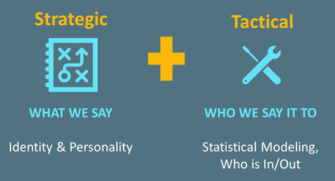What Should You Know When You “Know” A Donor?
Charities love to segment and design appeals and giving programs to fit a group. These groups are typically created using demographics (age or income) or donors’ giving history – sustainers, lapsed sustainers, one-time donors.
Segmentation works, helping create more effective appeals. Giving Tuesday can mean something very different to, say, a long-time monthly donor versus a passerby who made a single gift 17 months ago. Any charity would want to message these donors differently if they could.
Two assumptions underlie any segmentation:
- Donors differ from one another in ways relevant to fundraising.
- “One size doesn’t fit all” – personalized appeals are more effective.
Charities are so well-practiced at segmenting that professional fundraisers may gloss over their commitment to these two assumptions. Segmenting is “second nature.” Still, whenever a charity decides to segment, they’re endorsing these two assumptions.
But in making our segmentation second nature are we missing a beat?
Segmentation requires you know something relevant about your donors.
So, what exactly do you know when you “know” a donor? Or, if you want to get the most from your segmentation, what should you know when you get to know a donor?
To be sure, giving history and demographics are part of any answer.
But behavioral science gives us a framework for digging deeper, for asking about the psychological individuality of donors. And since it’s personalization we’re after, our best bet is turning to personality psychology.
Personality psychologists are in the business of continually asking the more general version of the question above. They ask, “What do you know when you know a person?” In fact, this classic paper by Dan McAdams bears the question in its title. Personality psychologists have come to recognize two broad categories of answers.
First, people differ in their foundational traits. Traits describe people’s dispositions, their typical ways of thinking, feeling, acting, and re-acting. Today, many personality psychologists subscribe to the “Big Five” or “OCEAN” model of personality traits; Openness to Experience, Conscientiousness, Extraversion, Agreeableness, and Neuroticism.
People have a little, some or a lot of each trait in them and your combination creates your profile. Your profile was mostly inherited, relatively stable, and predicts dozens of your choices, big and small including whether you donate and to whom.
Tailoring fundraising appeals to donors’ personality traits is effective.
Such appeals are more likely to be seen, processed, agreed with and acted on.

People differ based on personality and lots of other ways that may seem more familiar – e.g., attitudes, skills, habits, interests, goals, preferences, political orientations, and social roles. These are characteristics, influenced by personality but also acquired and shaped over one’s life. One type of special interest to fundraising is the self-concept, the way a person thinks and makes sense of themselves and their life.
“I’m a parent,” “I am an environmentalist,” “I’m an animal lover,” “I’m religious,” “I’m a cancer survivor”—these are just a few relevant examples. DonorVoice often refers to these as Identities.
Putting it together, we arrive at the figure below. We call it Personalized Matching, sorting donors into segments using psychological insights.
Personalized matching is strategic, using first principles to optimize the type or quality of the message you convey.
It’s also tactical because it aims optimize the efficiency with which you go about segmenting, marrying behavioral science with internally-defined, transactional data (e.g., giving history, donor type—sustainer, one-time, mid-level).
Putting these components together, a campaign can look something like this.

Note how existing transactional data is coordinated with both personality (Agreeableness, Conscientiousness) and identity (Parents, Non-Parents). Personalized Matching is the realization of the donor-centric mantra. It’s deeply tailored, evidence based, pragmatic and happening at a charity near you.
If you’d like to learn more about personalized matching for you, shoot us an email. We’d love to hear from you. In the meantime, you may find these related blog entries interesting.
charity: water Goes Mailing, Part 1?
charity: water Goes Mailing, Part 2
The Science of Personalized Matching
Why You Need Personalized Matching
Best wishes,
Dr. Stefano Di Domenico


